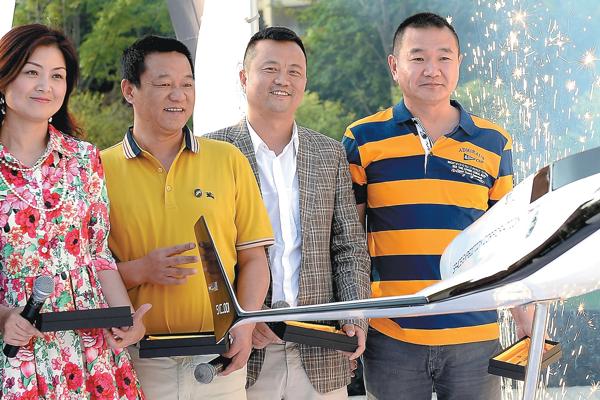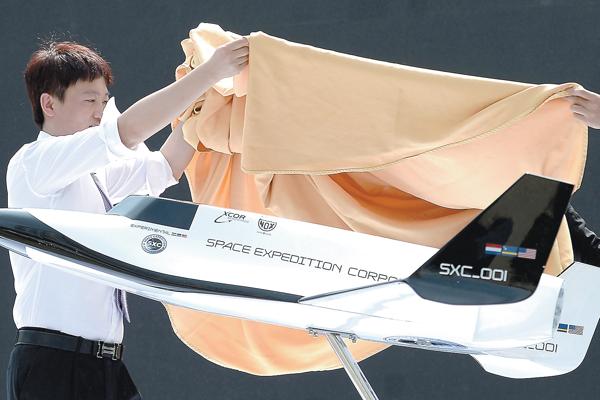
Four people in Chengdu, Sichuan province, sign up for space tourism. They’ll stay in space for 5 to 6 minutes, 103 km above Earth. It costs them each 720,000 yuan ($100,000).[Photo/China Daily]
Tong Jingjing hasn’t yet taken the private space flight she has booked but says her experiences since buying the ticket have already been out of this world.
The banker from Beijing says she has been surprised her planned trip (almost) to the stars has made her a star, and new opportunities have taken off before her spaceship.
“The ticket has changed my destiny,” says the 41-year-old banker from Beijing. “Agents have been chasing me, offering to turn me into a celebrity. Many companies have invited me to become their spokeswoman.”
Tong is among 32 Chinese who have booked flights aboard XCOR Aeronautics’ flight on the Lynx II craft scheduled to start ushering tourists into space between 2015 and 2016. She’ll pay about $100,000 to travel 103 km from Earth.

Four people in Chengdu, Sichuan province, sign up for space tourism. They’ll stay in space for 5 to 6 minutes, 103 km above Earth. It costs them each 720,000 yuan ($100,000).[Photo/China Daily]
Tong is excited to see how viewing the planet from afar will change how she looks at it after she returns.
“So many things have happened since I bought the ticket in July that make me think life is so wonderful,” she says.
A 3-D printing company asked her to test its model in zero gravity. A bank has invited her to be a spokeswoman for its credit card. And a cosmetics company offered her 2 million yuan ($326,000) to promote their products, she says.
“They thought I look much younger than my age when they saw my photo in media reports,” Tong says.
The BBC will document her life before the flight, she says. “If I don’t make it back to Earth, that will be a precious record for my family.”
The banker is no stranger to TV. She appeared on China’s popular dating program Take Me Out in 2012. “I tried to find my partner on the show, so we could go to the South Pole together,” she says. “But I failed.”
Tong is planning a reality TV show of her own. Jiangsu TV plans to broadcast I Want to Go to Space this year, she says. A thousand contestants from around the world, including 30 Chinese, will compete in various challenges, and the winner will receive a ticket to space.
When Tong traveled to the South Pole, she planted the flag of the prestigious Tsinghua University, where she earned her master’s in business administration. After the school’s alumni association learned she was planning to travel to space, they agreed to ask 100,000 members to pool money to pay for her ticket if she’d bring the flag.
.jpg)
XCOR tests fire its Lynx engine with a lightweight nozzle.[Photo/China Daily]
But she hasn’t accepted any offers yet. While she is in space, Tong says she will write wishes for her mother to recover from her illness and a note saying: “I love you, Mom.”
“I’ve thought carefully about what I’ll do in space,” Tong says.
Tong aims to educate teens about spaceflight, and wants to raise money for a museum dedicated to the industry. “I believe space flights will be as common as expeditions to the poles in 10 or 20 years,” she says.
Tong hopes to train people planning to take private spaceflights, teaching them basic spaceship safety.
About a dozen classmates from Tong’s other school-the Beijing University of Aeronautics and Astronautics, where she earned her bachelor’s in finance-have formed a volunteer support team for her flight.
“They come from different fields, such as airspace engine research, space technology and flight reliability,” she says. “They’ll offer consultations on my health, safety and the like.”
While Tong meets the health requirements for the trip, which are lower than those for astronauts, she has started boxing training three times a week to ensure she’s in peak condition.
“I want to increase my body’s ability to withstand strong G-forces when returning to Earth,” she says.
She has also started training for weightlessness and reads books about piloting aircraft. “I force myself to study for about an hour a day,” she says, even though it’s not required.
.jpg)
The training equipment provides services for passengers to make sure they are physically qualified to fly in space.[Photo/China Daily]
“I work at a bank, so it’s natural for me to minimize risks. I’ve prepared for the worst-case scenario-that I die in space.”
Tong has learned functions of the spacecraft’s buttons. “What if something is wrong with the pilot?” she asks. “We should know how to deal with it.”
She hasn’t told her parents about her plans to travel into space because she doesn’t want them to worry. “(Many) people have gone into space,” she says. “I won’t be the first. I think it’s relatively safe, and I accept the risks.”
Tong, a private client manager at China Minsheng Bank, says most of the billionaire clients she works with are also interested in taking a trip to space. “They say they’ll go if I return safely.”
About 10 of her 50 wealthiest clients have made such pledges, she says.
Tong believes the extremes of the spaceflight will change her perspective on life, adding that the trips to the Arctic and Antarctic also changed her outlook. “I became tolerant of others and passionate about environmental protection,” she says.
“The spaceflight will open a new chapter in my life. The ticket cost equals two years of my income. But life is an experience. Even if I don’t make it back to Earth, I won’t regret the trip. The spaceflight makes think seriously about death.”
It has also made her think about some of the next adventures in her life-marriage and motherhood.
“Media are chasing me because I’m a single woman in my 40s with a well-paid job and good English-speaking skills,” Tong says.
“I want to show the world a new image of Chinese women-independent, strong and confident. But I still long to marry and become a mom.”
